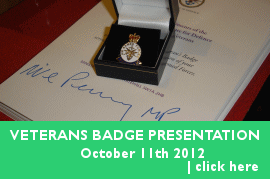Kosovo
27th June 2007
During a debate on the future status of Kosovo, Mike Penning pays tribute to NATO forces and calls on the Government to put pressure on the US not to impose a solution on the Balkans but instead work towards a negotiated agreement.
Mike Penning (Hemel Hempstead) (Con): I congratulate my hon. Friend the Member for The Wrekin (Mark Pritchard) on securing the debate and articulating so much knowledge about a very complicated subject. I also congratulate the hon. Member for Thurrock (Andrew Mackinlay), who, I am sure, understands the subject far better than I do.
Without delaying the House for too long, I want to join other Members in trying to encourage the Minister to slow down. We have heard a lot about big-tent politics in the past few days, and if there is one part of the world where we need big-tent politics, it is the Balkans. It is absolutely crucial that we do not assume that, as a Library paper said recently, the only main players are those that were there in 1994—America, the UK, France, Germany, Italy and Russia. The picture is much bigger than that. Sadly, so much blood was shed to get to the position where we are now, both before NATO got involved and subsequently. We must not forget the desperate situation in Kosovo before the NATO troops were there. I pay tribute from the Conservative Back Benches to the former Prime Minister for the work that he did to help to secure peace in Kosovo.
We must not do anything that jeopardises the extraordinarily delicate situation in the Balkans. If we push ahead, perhaps for the sake of our American colleagues and their political situation, and ignore that delicate situation, we will imperil not only the people of the Balkans but, again, our own troops. That part of the world has a very delicate history. We should not forge ahead with an outcome that the majority of people in Serbia and in Kosovo are not on board with, so that they feel that it is being imposed on them by the Contact group, nor should we ignore the views of the other countries involved, including Greece and Albania.
I am not a great lover of the European Union, but it has its uses. If we can create peace in Europe, especially in the Balkans where it has been so difficult to achieve over the centuries, by encouraging these countries to join the EU—to see the bigger picture and be part of the European movement—that is one aspect of the EU that I am sure that British taxpayers would be happy to pay for.
As I said, I do not want to detain the House. The Minister has heard the message this evening that we should not push forward too fast. If more hon. Members were present, I am sure that he would have heard the same sentiments from them. Eight years is a short time in the history of the Balkans. We have a golden opportunity, for which British and NATO soldiers have paid with their lives, to have lasting peace in that part of the world. I urge the Minister—or whoever will be in post—the new Foreign Secretary and the new Prime Minister to say, when they visit their American counterparts, “Slow down. Give these people a chance to be involved. Don’t exclude them or impose anything on them.” Excluding them or imposing a solution could put the rest of Europe in jeopardy.
...
MIKE'S OTHER CONTRIBUTIONS TO THE SAME DEBATE
Mike Penning (Hemel Hempstead) (Con): I thank my hon. Friend for his generosity in giving way. May I take him back to his comments about NATO and invite him to join me in congratulating the NATO and British troops who helped to secure the peace in Kosovo? We would not be able to discuss peace and Kosovo’s future were it not for the brave personnel in our armed forces, especially the British armed forces.
Mark Pritchard: Absolutely. My hon. Friend, as ever, makes a pertinent and well put point, and I pay tribute to all the members of Her Majesty’s armed services who served, or are serving, in the Balkans. He will know that more than 200 members of the intelligence corps and signal regiment are serving in Kosovo today, and the former Prime Minister was right to refer to that in the House today.
...
Mike Penning: My background is that of a military historian, and the history of the Balkans is especially long and detailed. The Minister referred to drift, which is an important issue. Some parts of the world do not have railway stations, but the train goes through at a speed at which people can get on it without it stopping. If the process goes forward too fast, the other parties will not be able to join it. Rather than drift, the pace must not be that of a race: the other participants must be able to get involved rather than being left behind.
Dr. Howells: It is a good analogy, but I would rather see the train stop—
Mike Penning: It might never start again.
Dr. Howells: That is true, although I am confident that it would. I take the hon. Gentleman’s point. The Security Council now needs to face up to its responsibilities. It will be a tough period and require tough decisions, but it has no choice but to make them. The time has come to do that.









